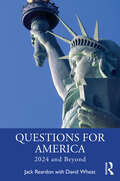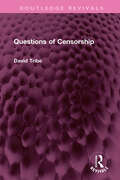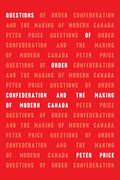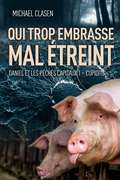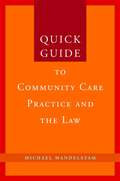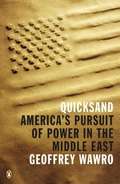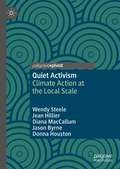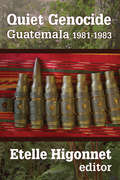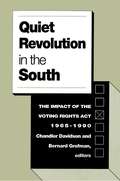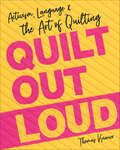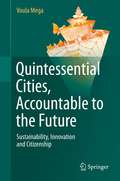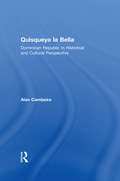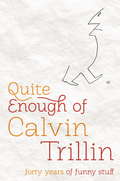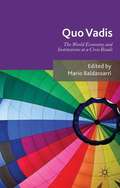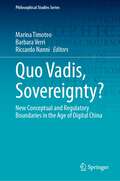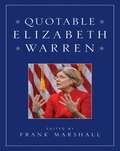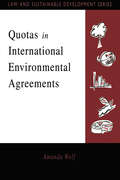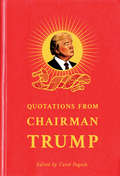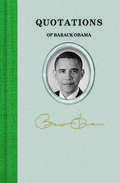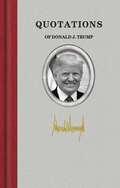- Table View
- List View
Questions for America: 2024 and Beyond
by David Wheat Jack ReardonTo solve its multiple challenges post-2024, America must act with intelligence and wisdom, which can only come from an active and well-informed citizenry. The issues that confront us post-2024 are profound: climate change, inequality, artificial intelligence, an unstable geopolitical global order, existential threats from unfriendly nations, just to name a few. A democracy needs an educated society, which requires not just information, but knowledge and understanding.As the dust settles from the 2024 presidential election, we are faced with several philosophical issues. How we act post-2024 will affect our America and our children's America. Our future depends on the proactive action that we take now, which is influenced by how much we understand today's issues. This is a book about today's America.
Questions of Censorship (Routledge Revivals)
by David TribeFirst published in 1973 Questions of Censorship offers a lively yet scholarly account of the forces that have exercised censorship down the ages. Unlike most other works on this theme, which have been confined to media, legislation, or countries, this book essays a broader theme, viewing censorship within the total context- psychological, sociological, and political. Although attention is focused mainly on censorship in Britain, this is set in perspective by comparative accounts of the situation in the United States, France, and the Soviet Union. This book will be a valuable reference work for students of media studies, political studies, and for general readers.
Questions of Order: Confederation and the Making of Modern Canada (G - Reference,information And Interdisciplinary Subjects Ser.)
by Peter PriceWhat happened on 1 July 1867? Over 150 years after Canadian Confederation, it seems like a question with an obvious answer. Questions of Order argues that Confederation was not just a political deal struck by politicians in 1867, but a process of reconfiguring political concepts and the basis of political association. Breaking new ground, Questions of Order argues that Confederation was an imperial event that generated new questions, concerns, and ideas about the future of political order in the British Empire and the world. It traces how for many public writers in English Canada, Confederation became an important basis for reimagining political order in the empire and redefining basic political concepts. To some, it marked a clear step in the larger project of imperial federation or even the ultimate union of the English-speaking world. For others, however, it represented the certain fragmentation of the empire into sovereign "national" states. Set in the context of a time of enormous social and cultural change, when so many long-held assumptions and firmly believed truths were faltering in the wave of new scientific and philosophical beliefs, the creation of Canada forced writers and public thinkers to grapple with the nature of political association and attempt to find new answers to critical questions of order.
Qui Es-Tu ? Ella la Princesse enchantée
by Agnes Ruiz Rosaria L. CalafatiDans un beau royaume, caché au-delà de la forêt enchantée, vit une jeune princesse nommée Ella. Elle est différente des autres princesses. Ella n’a pas de cheveux. Elle essaye souvent de cacher sa tête avec des foulards et des bandeaux et n’aime pas se regarder dans les miroirs. Ella rêve toujours de pouvoir un jour explorer au-delà des portes majestueuses du château. Cependant, pour cela, elle doit traverser le Grand Hall, mais il y a tellement de miroirs redoutables sur les murs. Ces miroirs sont les gardiens du château et ne laisseront passer quiconque à moins que la personne soit reconnue. Rejoignez Ella pour sa première aventure dans le Grand Hall ! Pourquoi les miroirs ne connaissent-ils pas Ella, et qu’aura-t-elle à faire pour quitter sa chambre et partir en exploration ?
Qui trop embrasse mal étreint: Daniel et les péchés capitaux - 1 CUPIDITÉ (Daniel et les péchés capitaux #1)
by Michael ClasenUn navire côtier danois est attaqué par des pirates dans le golfe de Guinée et un des vigiles est blessé. Il retourne sur ces entrefaites dans la petite ville de Haubjerg où il a grandi et s’établit comme détective privé. Il contribue de manière décisive à l’enquête lorsque des événements mystérieux et fatidiques se produisent au domaine de Tranedal. Le détective privé Daniel Dreyer fait ses débuts dans Cupidité meurtrière. Il découvre que des activités inhabituelles et menaçantes sont menées en catimini… Un polar accusateur et une critique de la société.
Quick Guide to Community Care Practice and the Law
by Michael MandelstamThis short guide cuts through the confusing mass of legislation to provide a concise and jargon-free explanation of current community care practice and the law. In clear and simple language, it explains the legislation directly relevant to practitioners, including: rules about how people in need get an assessment from local authorities; the assessment of need itself; eligibility for actually getting a service (and the "fair access to care" policy); charging for services; ordinary residence; topping up of care home fees; assessing informal carers; and the rules about asylum seekers. It provides an overview and analysis of high profile issues such as direct payments, personal budgets and the policy of personalisation and National Health Service provision, including the vexed issue of NHS continuing health care. It also highlights the duties placed on local authorities and the NHS, the various tensions underlying community care, and the consequent shortcuts - both lawful and unlawful - that local authorities and the NHS feel obliged to take. Quick Guide to Community Care Practice and the Law is an essential resource for busy practitioners at all levels as well as managers in both the statutory and voluntary sectors, policy-makers in local authorities and the NHS, advocates, lawyers and social work students.
Quicksand
by Geoffrey WawroAn unprecedented history of American involvement in the Middle East. In this definitive and revelatory work, noted historian Geoffrey Wawro approaches America's role in the Middle East in a fundamentally new way-by encompassing the last century of the entire region rather than focusing narrowly on a particular country or era. With verve and authority, he offers piercing analysis of the region's iconic events over the past one hundred years-from the birth of Israel to the rise of Al Qaeda. Throughout, he draws telling parallels between America's past mistakes and its current dilemmas, proving that we're in today's muddle not just because of our old errors but because we keep repeating those errors.
Quiet Activism: Climate Action at the Local Scale
by Jason Byrne Wendy Steele Diana MacCallum Jean Hillier Donna HoustonThis book focuses on the potential and possibilities for socially innovative responses to the climate emergency at the local scale. Climate change has intensified the need for communities to find creative and meaningful ways to address the sustainability of their environments. The authors focus on the creative and collaborative ways local- scale climate action reflects the extra-ordinary measures taken by ordinary people. This includes critical engagement with the ways in which novel social practices and partnerships emerge between people, organisations, institutions, governance arrangements and eco-systems. The book successfully highlights the transformative power of socially innovative activities and initiatives in response to the climate crisis; and critically explores how different individuals and groups undertake climate action as ‘quiet activism’ – the embodied acts of collective disruption, subversion, creativity and care at the local scale.
Quiet Genocide: Guatemala 1981-1983
by Etelle HigonnetQuiet Genocide reviews the legal and historical case that genocide occurred in Guatemala in 1981-1983. It includes the full text of the genocide section of a United Nations sponsored Commission on Historical Clarification in Guatemala (CEH), brokered by the UN. In its final report, the CEH's rigorously reviewed abuses throughout the whole country. However, the memory of the Guatemalan dirty war, which predated the genocide and continued for over a decade of the heightened killing, has rapidly faded from international awareness. The book renders a historical picture of the 1948 Genocide Convention and its unique status in international law. It reminds readers of the difficulty of preventing and punishing genocide as illustrated by the ongoing tragedy of Darfur; anddiscusses the evolution of international and hybrid tribunals to prosecute genocide along with war crimes and crimes against humanity. Then, it sketches a brief history of Guatemala with a focus on genocide It explores how internal and global politics were an expression of structural violence, designed to ensure cheap, abundant, and quiescent Indian labor for coffee planters.a The volume provides the commission's general considerations, legal definitions, methodology, period of analysis, and victim groups, and finds that genocide had been perpetrated against five indigenous Guatemalan groups. By translating the genocide argument of the CEH into English and framing it in a lively, accessible way, this volume recovers the past, sets the record straight, and promotes accountability. This exploratory effort provides insight into the world of transitional justice and truth commissions, and valuable insights about how to engage with the question of genocide in the future. These findings shed light on a crucial and dark chapter of trans-American Cold War history, and will thus be of interest not only to scholars focused on Guatemala, but also on Central America and even more broadly, on the Cold War.
Quiet Politics and Business Power
by Pepper D. CulpepperDoes democracy control business, or does business control democracy? This study of how companies are bought and sold in four countries - France, Germany, Japan, and the Netherlands - explores this fundamental question. It does so by examining variation in the rules of corporate control - specifically, whether hostile takeovers are allowed. Takeovers have high political stakes: they result in corporate reorganizations, layoffs, and the unraveling of compromises between workers and managers. But the public rarely pays attention to issues of corporate control. As a result, political parties and legislatures are largely absent from this domain. Instead, organized managers get to make the rules, quietly drawing on their superior lobbying capacity and the deference of legislators. These tools, not campaign donations, are the true founts of managerial political influence.
Quiet Revolution in the South: The Impact of the Voting Rights Act, 1965-1990
by Chandler Davidson & Bernard GrofmanThis work is the first systematic attempt to measure the impact of the Voting Rights Act of 1965, commonly regarded as the most effective civil rights legislation of the century. Marshaling a wealth of detailed evidence, the contributors to this volume show how blacks and Mexican Americans in the South, along with the Justice Department, have used the act and the U.S. Constitution to overcome the resistance of white officials to minority mobilization. The book tells the story of the black struggle for equal political participation in eight core southern states from the end of the Civil War to the 1980s--with special emphasis on the period since 1965. The contributors use a variety of quantitative methods to show how the act dramatically increased black registration and black and Mexican-American office holding. They also explain modern voting rights law as it pertains to minority citizens, discussing important legal cases and giving numerous examples of how the law is applied. Destined to become a standard source of information on the history of the Voting Rights Act, Quiet Revolution in the South has implications for the controversies that are sure to continue over the direction in which the voting rights of American ethnic minorities have evolved since the 1960s.
Quiet Rumours
by Emma Goldman Dark Star Collective Roxanne Dunbar-Ortiz Jo Freeman Voltairine De CleyreThis is a fascinating window into the development of the women's movement in the words of those who moved it. Compiled and introduced by the UK-based anarchist-intellectual collective Dark Star, Quiet Rumours features articles and essays from four generations of anarchist-inspired feminists, including Emma Goldman, Voltairine de Cleyre, Jo Freeman, Peggy Kornegger, Cathy Levine, Roxanne Dunbar-Ortiz, Mujeres Creando, Rote Zora, and beyond. All the pieces from the first two editions are included here, as well as new material bringing third and so-called fourth-wave feminism into conversation with twenty-first century politics. An ideal overview for budding feminists and an exciting reconsideration for seasoned radicals.
Quilt Out Loud: Activism, Language & the Art of Quilting
by Thomas KnauerExplore language through quilting How do letters, numbers, words, and sentences change when used on a quilt rather than a screen or piece of paper? Statement quilts are an emerging trend within the modern quilt movement. Quilt artist Thomas Knauer’s quilts follow the craftivism movement and emphasize social justice issues. From the most serious to whimsical, Quilt Out Loud teaches techniques for making text a part of the readers’ quilts. Each chapter focuses on a particular technique, such as raw-edge applique or piecing in Morse code, and explores its conceptual implications. Craftivism is a rising trend where quilters are using text on quilts to make a statement and take part in social movements Explore methods of effectively incorporating language and data on quilts, whether profound or playful Learn how to use applique, quilted text, binary numbers, morse code, and more for self-expression
Quintessential Cities, Accountable to the Future: Sustainability, Innovation and Citizenship
by Voula MegaThis book can be seen as the third part of an unofficial trilogy on Sustainable Cities of the Future with the author's previous books 'Sustainable Development, Energy and the City' and 'Sustainable Cities for the third millennium: The Odyssey of urban excellence', both prefaced by Prof. Sir Peter Hall. All three books follow the evolving forefront of innovations towards Sustainable Cities. They collectively try to respond to the questions: What future cities wish to build (with their scarcities and capacities) on a finite planet? What do-they do to achieve this? How do-they contribute to redesign the world? The third book adopts, first and foremost, a strategic foresight approach including a scan of the future trends, tensions and risks in a more uncertain world, the possible and preferable futures, emerging policy issues, such as intergenerational cities or cities welcoming the immigrants and their impact on sustainable development, the Rio+20 prospects and the effects of the protracted crisis, efforts by world interconnected cities, including a case-study on Bangkok, a laboratory of urban change, and examples of frugal and resilient urban policies.
Quisqueya la Bella: Dominican Republic in Historical and Cultural Perspective (Perspectives On Latin America And The Caribbean Ser.)
by Alan CambeiraA history of the Dominican Republic from pre-Columbian times to the present. The book focuses on the merger of three cultures across time - the indiginous cultures of the Caribbean, the Iberians of southern Europe and the Africans.
Quite Enough of Calvin Trillin
by Calvin TrillinFor at least forty years, Calvin Trillin has committed blatant acts of funniness all over the place--in The New Yorker, in one-man off-Broadway shows, in his "deadline poetry" for The Nation, in comic novels like Tepper Isn't Going Out, in books chronicling his adventures as a happy eater, and in the column USA Today called "simply the funniest regular column in journalism."Now Trillin selects the best of his funny stuff and organizes it into topics like high finance ("My long-term investment strategy has been criticized as being entirely too dependent on Publishers Clearing House Sweepstakes") and the literary life ("The average shelf life of a book is somewhere between milk and yogurt.")In Quite Enough of Calvin Trillin, the author deals with such subjects as the horrors of witnessing a voodoo economics ceremony and the mystery of how his mother managed for thirty years to feed her family nothing but leftovers ("We have a team of anthropologists in there now looking for the original meal") and the true story behind the Shoe Bomber: "The one terrorist in England with a sense of humor, a man known as Khalid the Droll, had said to the cell, 'I bet I can get them all to take off their shoes in airports.' " He remembers Sarah Palin with a poem called "On a Clear Day, I See Vladivostok" and John Edwards with one called "Yes, I Know He's a Mill Worker's Son, but There's Hollywood in That Hair." In this, the definitive collection of his humor, Calvin Trillin is prescient, insightful, and invariably hilarious.From the Hardcover edition.
Quo Vadis
by Mario BaldassarriThis study addresses the two major challenges facing the global economy: globalization and the European structural crisis. In addition, it takes a closer look at the impact of this on the Italian economy. The findings reflect on the issue of long term growth and suggest ways in which to create sustainable financial conditions for the future.
Quo Vadis, Sovereignty?: New Conceptual and Regulatory Boundaries in the Age of Digital China (Philosophical Studies Series #154)
by Marina Timoteo Barbara Verri Riccardo NanniThis book presents an interdisciplinary exploration of digital sovereignty in China, which are addressed mainly from political, legal and historical point of views. The text leverages a large number of native Chinese experts among the authors at a time when literature on China’s involvement in internet governance is more widespread in the so-called “West”. Numerous Chinese-language documents have been analysed in the making of this title and furthermore, literature conceptualising digital sovereignty is still limited to journal articles, making this one of the earliest collective attempts at defining this concept in the form of a book. Such characteristics position this text as an innovative academic resource for students, researchers and practitioners in international relations (IR), law, history, media studies and philosophy.
Quotable Elizabeth Warren
by Frank MarshallUS Senator Elizabeth Warren has long been an original thinker and a powerful voice for the common man. Having worked her first job at the age of nine and witnessed first-hand the economic struggles of the American middle class, Warren never hesitates to tell the truth about the US economy. She has been a strong advocate for consumer protection; her work has led to the creation of the US Consumer Financial Protection Bureau.Discover in her own words the woman who has been called "a New Sheriff of Wall Street" by TIME magazine, and "the plainspoken voice of people getting crushed by so many predatory lenders and under regulated banks" by the Boston Globe."There is nobody in this country who got rich on their own. Nobody. . . . Part of the underlying social contract is you take a hunk of that and pay forward for the next kid who comes along.""Hardworking men and women who are busting their tails in full-time jobs shouldn't be left in poverty.""If you're caught with an ounce of cocaine, the chances are good you're going to jail. . . Evidently, if you launder nearly a billion dollars for drug cartels and violate our international sanctions, your company pays a fine and you go home and sleep in your own bed at night."
Quotable Reagan: Words of Wit, Wisdom, Statesmanship By and About Ronald Reagan, America's Great Communicator
by Steve EubanksFormer President Reagan, long remembered as the Great Communicator, never was at a loss for words, and his profound wisdom and wit are presented in this unique, impactful book covering more than fifty years from Hollywood to 1600 Pennsylvania Avenue and beyond.
Quotas in International Environmental Agreements (Earthscan Law and Sustainable Development)
by Amanda WolfQuotas have been used in international environmental agreements for at least a century and, in tandem with incentive approaches, should continue to be crucial to realizing a sustainable environment. This text is a critical examination of quotas both as regulatory tools and as products of negotiation. It reviews the main features of environmental problems, the regulatory options and criteria used to judge them, and the various ways of explaining negotiated outcomes. Quotas in the management of fisheries, other resources, freshwater and marine pollution, and air pollution are also described. Selected examples are considered in detail to provide an understanding of how quotas were developed in scientific, political, economic and social context. An assessment of the key features of quotas in practice leads to the identification of an emerging approach, the negotiation of constrained local quotas. The approach is a practical way to balance efficiency and fairness in complex negotiations, without sacrificing environmental effectiveness.
Quotations from Chairman Trump
by Carol PogashThe essential wit and wisdom of President Trump: a compendium of things an actual US president actually said out loud to other people.President Donald J. Trump possesses a great sense of history and himself. A model statesman, he tweets every thought, and more. With one exception, he doesn&’t suffer fools lightly. This little red book attempts to capture the great man&’s philosophy on governance, democracy, terrorism, and his hair.The President&’s words are preserved here―both as a public service and as a keepsake. Unfiltered. Unabridged. Unauthorized. Unbelievable.Sample quotes include:I&’m, like, a really smart person.The Bible means a lot to me, but I don&’t want to get into specifics.It has not been easy for me; and you know I started off in Brooklyn; my father gave me a small loan of a million dollars.While in politics it is often smart to send out false messages.As seen on MSNBC&’s Hardball with Chris Matthews
Quotations from Speaker Newt: The Little Red, White and Blue Book of the Republican Revolution
by Peter W. Bernstein Amy D. BernsteinA book devoted to gaining a better understanding of Newt Gingrich, American politician.
Quotations of Barack Obama (Quotations of Great Americans)
by Barack ObamaBe inspired by quotations from Barack Obama, our 44th, and first African-American President of the United States, in this elegant hardcover edition. This collection of motivational and inspirational quotes will make you feel good about America. Featuring a portrait of President Obama on the front cover with his signature printed below in gold foil, this classic collection of Obama quotes will inspire everyone who opens its covers.
Quotations of Donald J. Trump (Quotations of Great Americans)
by Donald John TrumpNotable Quotations from President Donald J. Trump This pocket-sized hardcover book contains nearly one hundred quotations on business, government, politics, culture and more from America's forty-fifth president, Donald J. Trump. "I'm going to fight for every American in every last part of this nation." - Donald J. Trump, Hardball with Chris Matthews , August 4, 2017
